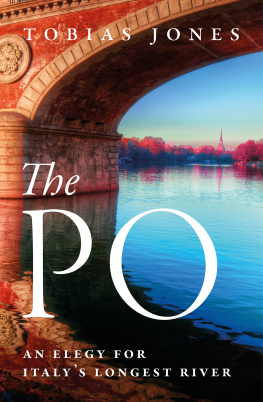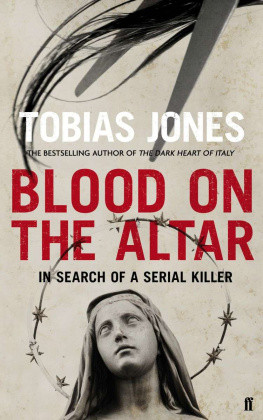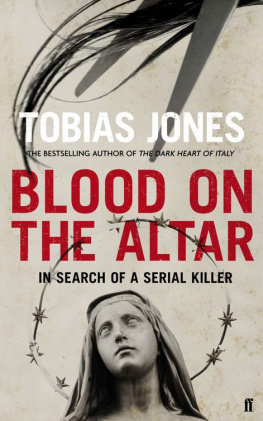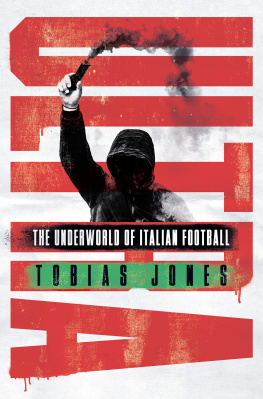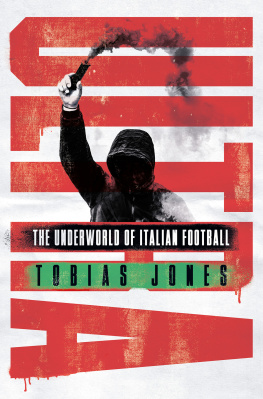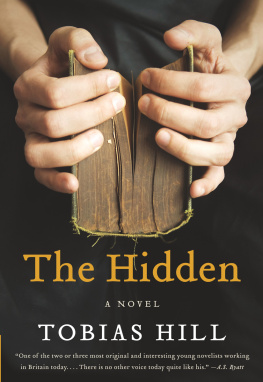Tobias Jones - The Po: An Elegy for Italys Longest River
Here you can read online Tobias Jones - The Po: An Elegy for Italys Longest River full text of the book (entire story) in english for free. Download pdf and epub, get meaning, cover and reviews about this ebook. year: 2022, publisher: Head Of Zeus, genre: Art. Description of the work, (preface) as well as reviews are available. Best literature library LitArk.com created for fans of good reading and offers a wide selection of genres:
Romance novel
Science fiction
Adventure
Detective
Science
History
Home and family
Prose
Art
Politics
Computer
Non-fiction
Religion
Business
Children
Humor
Choose a favorite category and find really read worthwhile books. Enjoy immersion in the world of imagination, feel the emotions of the characters or learn something new for yourself, make an fascinating discovery.
- Book:The Po: An Elegy for Italys Longest River
- Author:
- Publisher:Head Of Zeus
- Genre:
- Year:2022
- Rating:5 / 5
- Favourites:Add to favourites
- Your mark:
- 100
- 1
- 2
- 3
- 4
- 5
The Po: An Elegy for Italys Longest River: summary, description and annotation
We offer to read an annotation, description, summary or preface (depends on what the author of the book "The Po: An Elegy for Italys Longest River" wrote himself). If you haven't found the necessary information about the book — write in the comments, we will try to find it.
The Po: An Elegy for Italys Longest River — read online for free the complete book (whole text) full work
Below is the text of the book, divided by pages. System saving the place of the last page read, allows you to conveniently read the book "The Po: An Elegy for Italys Longest River" online for free, without having to search again every time where you left off. Put a bookmark, and you can go to the page where you finished reading at any time.
Font size:
Interval:
Bookmark:

The
PO
The Dark Heart of Italy
Utopian Dreams
The Salati Case
White Death
Blood on the Altar
Death of a Showgirl
A Place of Refuge
Ultra
The
PO
AN ELEGY FOR
ITALYS LONGEST RIVER
TOBIAS JONES
www.headofzeus.com
First published in the UK in 2022 by Head of Zeus Ltd,
part of Bloomsbury Publishing Plc
Copyright Tobias Jones, 2022
The moral right of Tobias Jones to be identified as the author of this work has been asserted in accordance with the Copyright, Designs and Patents Act of 1988.
All rights reserved. No part of this publication may be reproduced, stored in a retrieval system, or transmitted in any form or by any means, electronic, mechanical, photocopying, recording, or otherwise, without the prior permission of both the copyright owner and the above publisher of this book.
A catalogue record for this book is available from the British Library.
ISBN (HB): 9781786697394
ISBN (E): 9781786697387
Maps by Jamie Whyte
Image credits: View of Mantova, 1575 courtesy of Wikimedia Commons. All photographs Tobias Jones.
The author is grateful for permission to quote from Four Quartets by T. S. Eliot (Faber and Faber Ltd)
Every effort has been made to trace copyright holders and to obtain their permission for the use of copyright material. The publisher apologizes for any errors or omissions in the above list and would be grateful if notified of any corrections that should be incorporated in future reprints or editions of this book.
Head of Zeus Ltd
First Floor East
58 Hardwick Street
London EC1R 4RG
www.headofzeus.com
For Matteo Galloni (il Gallo)
La vita moderna ha un ritmo falso.
I nostri tassametri continuano a salire e
tutti abbiamo paura di non poter pagare.
Bruno Barilli, 1963
Modern life has a false rhythm.
Our fares keep rising and all of us fear we
wont be able to pay.
ACQUA DOLCE: Freshwater
ALPI COZIE: The Cottian Alps, the south-western section of the Alps whose symbol is MONVISO
ARCHIBUGIO: The arquebus gun
ARGINE (pl. ARGINI): Riverbank
ARGINE MAESTRO: The main riverbank (there is often a secondary one on the other side of the designated floodplain actually next to the water)
BASSA: Low-lying land/lowlands. Always accompanied by the definite article: LA BASSA
BODRIO (pl. BODRI): Floodplain lakes and ponds (aka BUGNO/I)
BONDINCUS: Synonym of River Po
BONIFICA (pl. BONIFICHE): Land reclamation
BUCO DI VISO: A tunnel excavated through MONVISO ( c. 147880), also known in French as le pertuis du Viso or le tunnel de la Traversette
BURATTINO: A glove puppet
CANNABIS SATIVA: The cannabis plant from which hemp is derived
CONDOTTIERO: A mercenary
DAUPHIN: A former province in south-eastern France under the control, until 1349, of the Counts of Albon (later called the Dauphins of Viennois due to the presence of a dolphin on their coat of arms)
DELIZIE: The delights of the Estensi dynasty
ERIDANO: A river of Greek mythology (Eridanos/Eridanus in English). Also the ancient Greek word for the River Po
ESCARTO[U]NS: A republic or federation straddling the Italo-French border in the Cottian Alps ( c. 12441713/1798)
ESTE (pl. ESTENSI): The SIGNORIA of Ferrara (12401597)
EUTROPHICATION: The enrichment of water by nutrients and minerals (very often agricultural fertilisers) leading to algal blooms
FARNESE: The SIGNORIA of Parma (15451731)
FOJONCO: One of the mythological beasts of the lowlands
FOSSA: A ditch
GOLENA (pl. GOLENE): Floodplain
GONZAGA: The SIGNORIA of Mantova (13281708)
IDROVORA: A pump station
LANZICHENECCHI: The Italianisation of Landsknechte , the Germanic foot soldiers of the Holy Roman Empires Imperial Army
LATIFUNDISMO: A system of great landed estates
LEFT BANK: Looking downstream, the bank on the left (usually the northern side of the Po)
MATAF: Abbreviation of Mediterranean Allied Tactical Air Force in the Second World War
MENTHA PIPERITA: Peppermint
MONDINA (pl. MONDINE): A female rice paddy worker ( mondare = to clean, peel or prune)
MONVISO: The mountain (3,842 metres) in whose Plain of the King the Po is born. Nicknamed Re di Pietra , Stone King
NUTRIA: Myocastor coypus (coypu)
PADUS: Synonym of River Po
PEDOCLIMATE: A microclimate within soil
PELLAGRA: A disease characterised by dermatitis, gastrointestinal disorders and mental disturbances associated with a diet deficient in niacin
PERCHED: A perched river has a bed higher than the surrounding ground elevation and is therefore not the lowest point in the valley
PIAN DEL RE: The Plain of the King, site of the source of the Po
PIANURA PADANA: The plain of the Po
PIENA: Full (used to describe the river when its almost flooding)
ROGGIA: An irrigation ditch
ROTTA: A breach in the riverbank
RIGHT BANK: Looking downstream, the bank on the right (usually the southern side of the Po)
RISAIA (pl. RISAIE): A rice paddy field
RISORGIMENTO: The movement for Italian unity in the nineteenth century
SICYOS ANGULATUS: Star-cucumber, aka ZUCCA PAZZA, the mad pumpkin
SIGNORIA: The governing dynasty of a city state
SINKHOLE: A hollow place or depression in which drainage collects; often connected to groundwater through cavities and swallets
TAGLIO: A cut (i.e. to divert the river)
TERRAMARE: Middle/Late Bronze Age settlements along the plain of the Po
VALDESI: the Waldensians, followers of Peter Valdo/Waldo of Lyon ( c .1140 c .1205). Aka Vaudois or Waldenses
Ive maintained the Italian spellings of all place names (although for geographical adjectives like Lombard or Emilian I have obviously kept the English). I have also maintained the Italian spellings of personal names to avoid mangling Vittorio into Victor and so on. Both place names and personal names should, however, be easily recognisable. A lot of writing about the river is either archaic or in dialect: the words are so rich and resonant that I have frequently quoted them in full (complete with unusual spellings) with translations alongside. Unless otherwise stated, translations (and challenging rhymes) are mine.

Im bobbing along in a small boat trying to work my way in but theres nothing to offer any bearings. In this eerie space, which is neither quite open sea nor solid land, it feels as if youre in a spacious maze of low-lying bars, islands and spits. All is flat. The sky is wide and the distant land is nothing more than blue-grey mould on the water.
Any ground here seems unsolid: the scanni , long sandbanks, are constantly dented or stretched by the slap of waves and the gusting winds. Little islands called bonelli emerge, moulded by the meeting of the tide and the rivers slow flow. Then, days or years later, they go under again. This is what they call, in dialect, pialassa the give and take of sea and river, of water and land.
Its no longer a place where humans belong. A ruined building stands in the water, its brick walls half gone, like a smashed-up Lego project. On every other spit there are abandoned churches, smokehouses and shacks. Absent windows and doors create dark, rectangular sockets.
Birds are in charge here. The executioners cap of a sandwich tern looks down on you from a post. Stilts, with their bubble-gum-pink legs, wade in the mud and algae alongside the avocets and redshanks. Every minute another grey heron or little egret leaps into the air, squawking annoyance at your invasion.
Font size:
Interval:
Bookmark:
Similar books «The Po: An Elegy for Italys Longest River»
Look at similar books to The Po: An Elegy for Italys Longest River. We have selected literature similar in name and meaning in the hope of providing readers with more options to find new, interesting, not yet read works.
Discussion, reviews of the book The Po: An Elegy for Italys Longest River and just readers' own opinions. Leave your comments, write what you think about the work, its meaning or the main characters. Specify what exactly you liked and what you didn't like, and why you think so.

